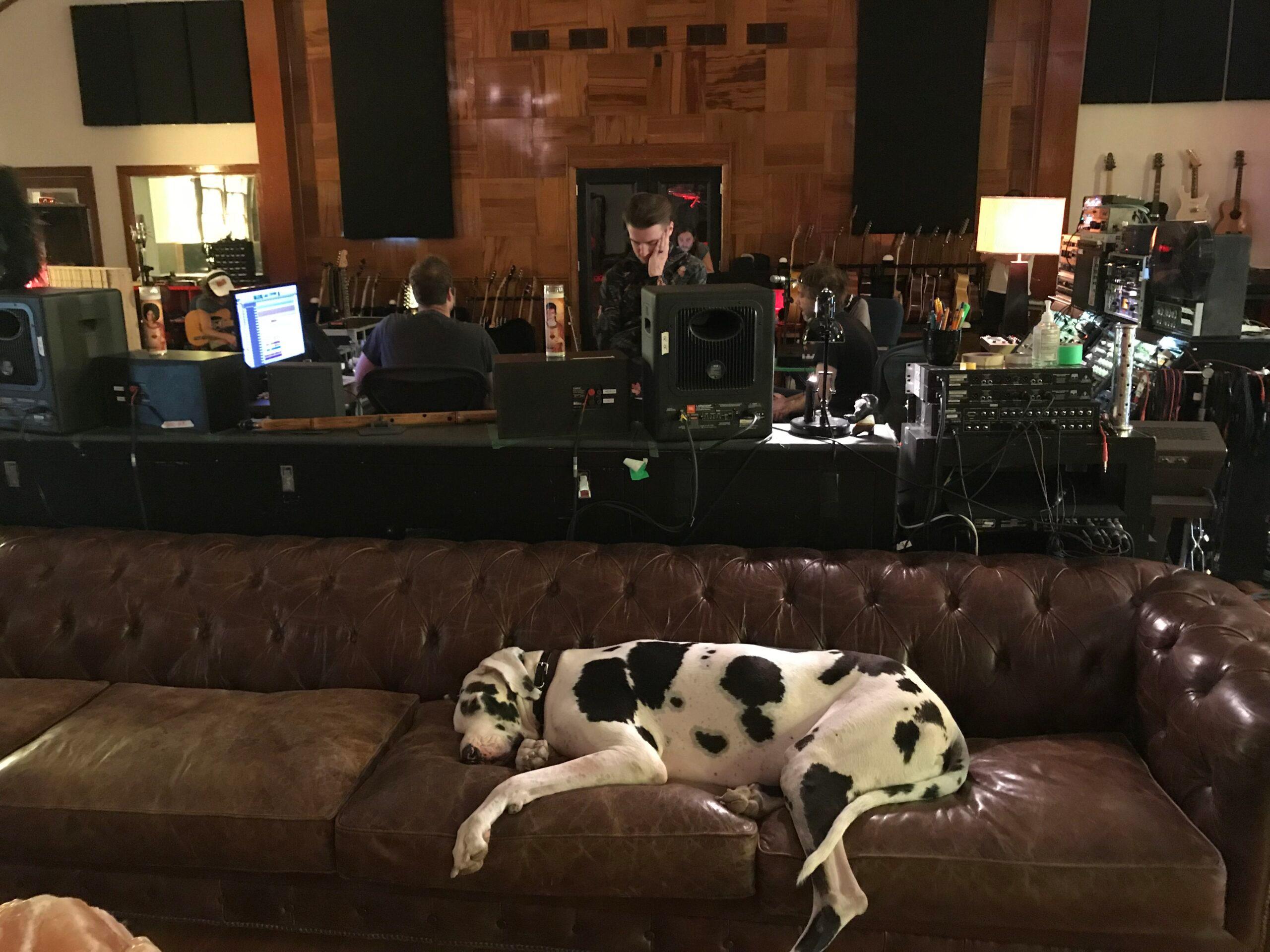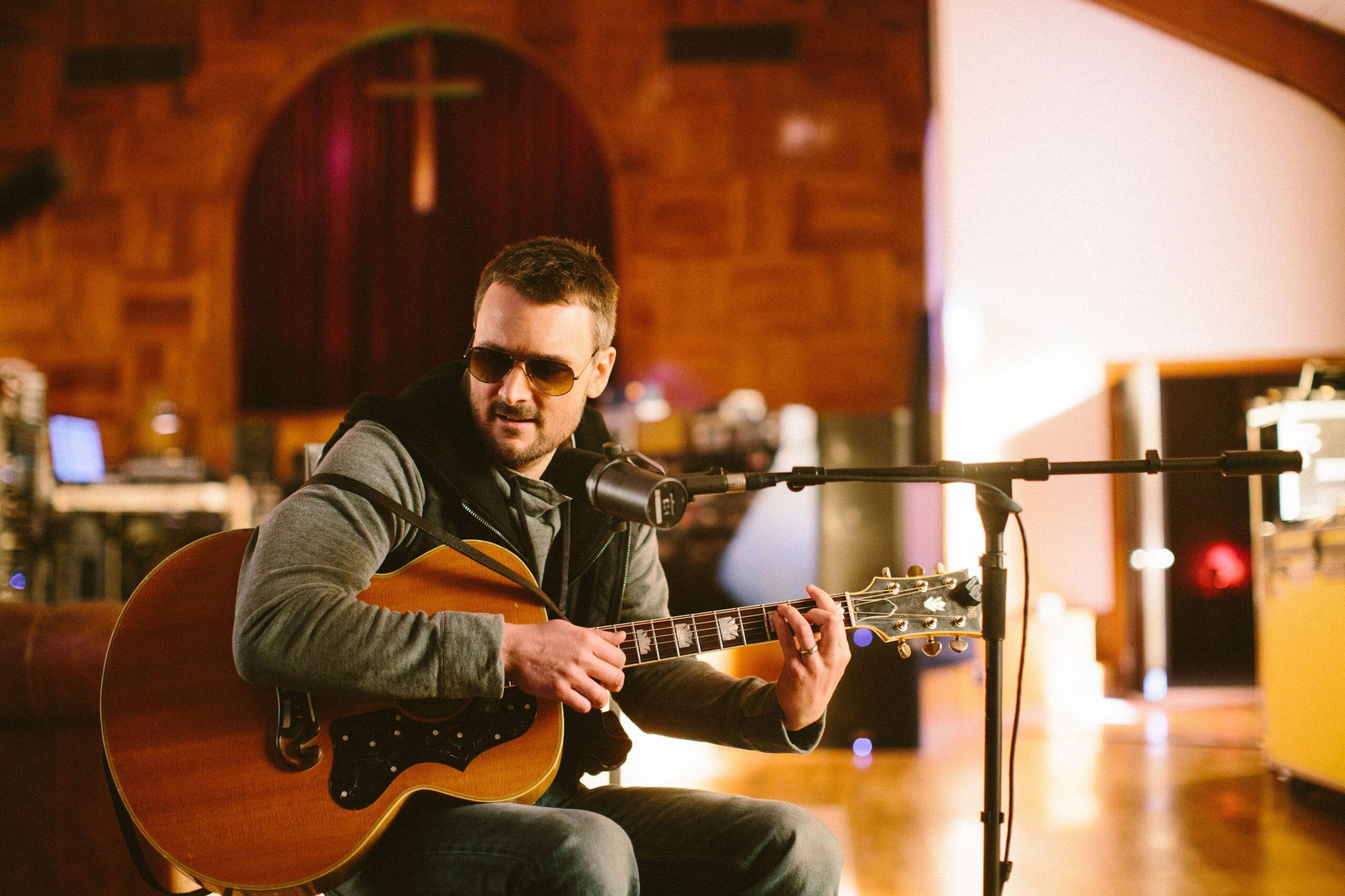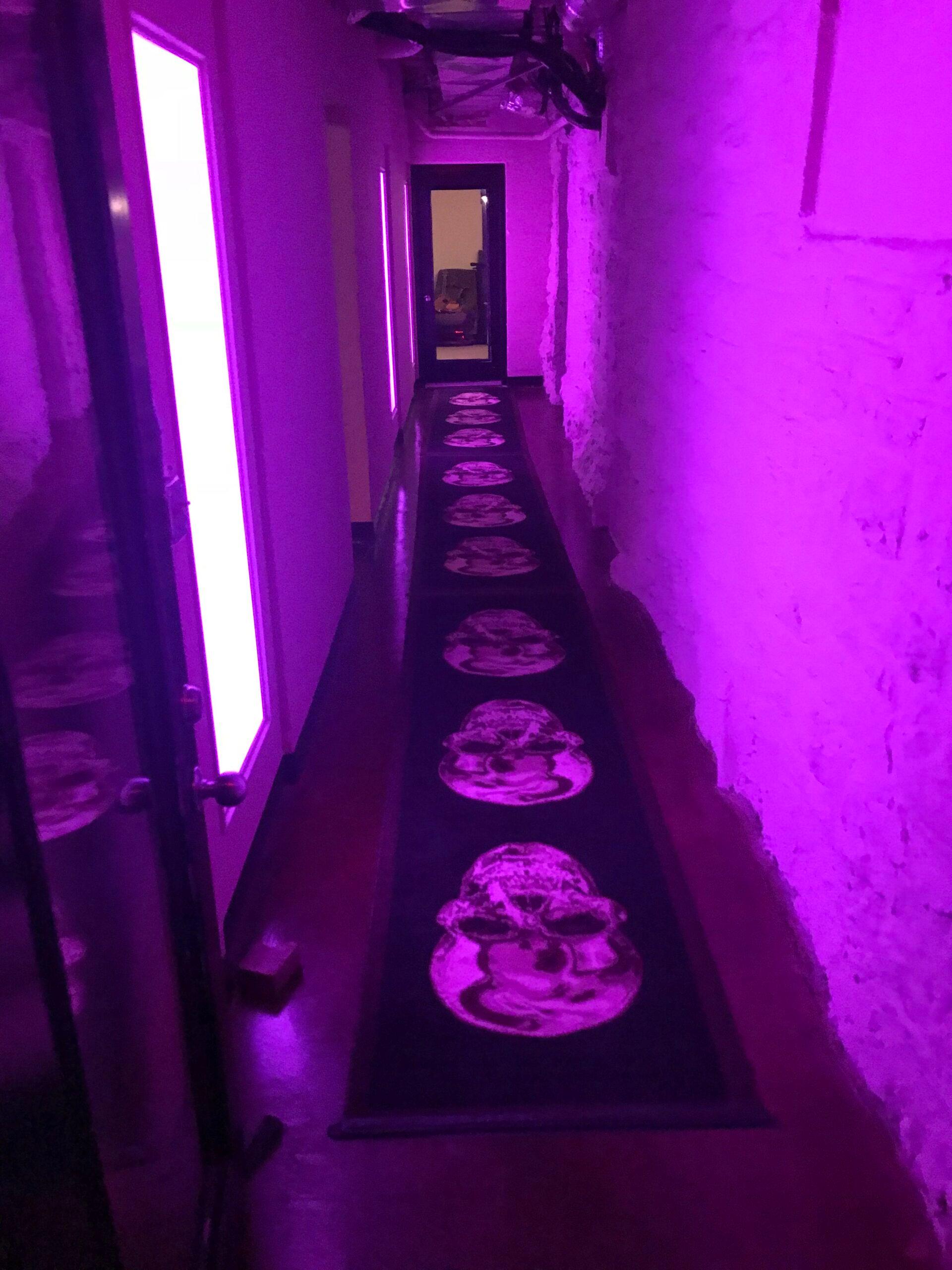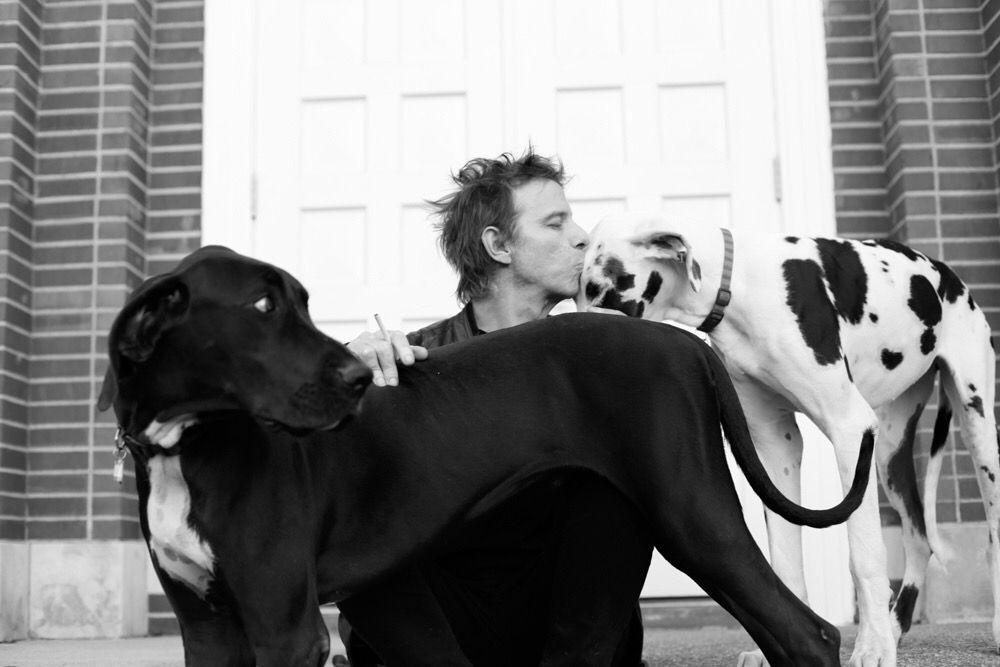“Dang, that sounds fuckin’ country, man,” says the drummer in the country band, as a ghostly keyboard squall fills the room where they’re recording what is ostensibly a country song. Everyone in the room cracks up, meaning everyone in the studio, meaning everyone in the church.
The keyboard squall is courtesy of Jay Joyce, the 55-year-old superproducer and proprietor of Neon Cross, an abandoned Southern Baptist church perched on a residential street in East Nashville, which he bought five years ago and transformed into a high-end recording studio. Best known for his six-albums-and-counting partnership with rowdy Nashville superstar Eric Church, Joyce has spent 20-plus years at the volatile nexus of country and rock, reinvigorating both genres one fearless and omnivorous project at a time, from Cage the Elephant to Brandy Clark, from FIDLAR to Keith Urban to the Wallflowers. “There was a week where we did Coheed and Cambria and Carrie Underwood in the same week,” he tells me at one point. “Dude, I mean, who gets to do that?”
The better question is who is even capable of doing that. On this sleepy August weekday afternoon, Joyce is hunkered down with LANCO, a young Nashville country-rock quintet with a very pleasing small-town Kings of Leon vibe. Joyce is a chain smoker among vapers, a scruffy outlier who fits any band, any situation perfectly. Today, they’re working on a new song called “Where You Been All My Life,” all genial keg-party come-ons and U2-style guitar anthemia, with a chorus that explodes into a mass chant of whoa-oh-whoa-oh.
The band, and the imposing mixing board, and the Pro Tools rig, and many of Joyce’s other wonderful toys are set up on one end of the room, where the back pews used to be; the drummer is ensconced via glass double doors in the Christmas-light-festooned drum room, where the church lobby used to be. At night, an actual fog-blue neon cross glows from the roof. Inside, two colossal and serene Great Danes named Monroe and Dupree roam the hardwood floors amid dim churchly light sifted through tall and narrow windows that mark, as recording studios do not typically mark, the steady passage of time. Several upright pianos with their innards exposed. Two dozen guitars. A trash-can lid resting on a tympani. On the altar sits a single drum set with a crucifix looming overhead and a womblike maroon tint to the lighting, plus a 12-foot, two-panel Joyce painting, in progress. “There’s gonna be an angel holding a machine gun and a knife, and a devil holding a flower,” Joyce explains to me when I arrive.

Then he wanders back over to the band, electric guitar slung over his shoulder, noodling. He is tall and wiry. Black T-shirt, black hoodie, black thick-framed glasses, healthy shock of gray hair, salt-and-pepper beard. What little press Joyce does, often of the tech-heavy gearhead variety, tends to note affectionately that he looks like one of the Replacements. At his station near the mixing board, a pack of Marlboros and a pack of American Spirits huddle together as though having a conversation. He is a thoughtful and restless man pacing a church floor, smoke rising from his head up to the vaulted ceiling. All anyone wants to be, even in country music, is a rock star. This guy will get someone there the fastest, and the trip will be the strangest.
I sit on a leather couch and watch LANCO work on “Where You Been All My Life” for eight hours, as it slowly deepens, and sharpens, and gets oh-so-slightly weirder. Joyce is all over the place. Fine-tuning the drumbeat. Should the bass stay on the one during that part? Not so much dissonance in that guitar bend. “I think it should be fucking soaring right there, when it comes out of the bridge.” After several full-band run-throughs, he calls for a break, and also for one of his assistants to set up the vocoder. Lead guitarist Eric Steedly wanders off to the well-appointed kitchen in a hallway behind the altar, whistling the chorus melody, and returns holding two cans of LaCroix.
I don’t want to be the guy. Because if you’re the guy, then you’re not the guy … do you know what I mean? That’s every story. Get a man, put him in a tree, and then throw stones at him until he falls off. Like, rolls on the ground. Every movie, every book I ever read, you know what I mean?Jay Joyce
There transpires a long interval of loopy stoner-comedy-parody talk. Topics include black holes, the singularity, the notion of all the matter in the universe being shrunk down to the size of a golf ball, and whether or not flamingos have backward knees. “I was gonna get a 17-foot-high taxidermied giraffe,” Joyce notes, discussing the room’s evolving decor, “but it was like 20 grand.” The room contemplates this. “Giraffes are definitely aliens, that’s for sure,” someone notes gravely.
Joyce is both one of the guys and The Guy. Even during this goofy recess, you can sense his higher purpose, cooling off his young charges’ brains, putting them back at ease, reloading. “I’d say 90 percent of it is psychological,” Joyce will later explain, breaking down both the art and the science of producing. “Get some good gear and some good microphones, and the rest is just trying to convince somebody that they’re not good, or they’re good. If they’re too good, you’ve got to kind of—it’s like, ‘Look, dude, you’re not there yet. Let’s work.’”
And so he controls the charged tedium of a professional recording session as adeptly as he plays guitar, or keyboards, or whatever else. In the hours to come, he will preside over a long discussion about adding a brief new section—code-named “The Dark Chord”—to the bridge. He will futz with every band member’s part individually. He will lightly alter singer Brandon Lancaster’s lyrics, changing “This ain’t another pickup line” to “This ain’t no sorry pickup line.” At 5:30 p.m. or so, he’ll send an assistant out for beer. (Coors.) He will preside over more silly banter: the benefits of microdosing mushrooms, the nostalgic allure of “cheap Mexican weed” in an era of boutique-pot oversaturation, the part of the Mekong River where orbs of fire appear in late October. Everyone forgets to eat anything.
And so he controls the charged tedium of a professional recording session as adeptly as he plays guitar, or keyboards, or whatever else. In the hours to come, he will preside over a long discussion about adding a brief new section—code-named “The Dark Chord”—to the bridge. He will futz with every band member’s part individually. He will lightly alter singer Brandon Lancaster’s lyrics, changing “This ain’t another pickup line” to “This ain’t no sorry pickup line.” At 5:30 p.m. or so, he’ll send an assistant out for beer. (Coors.) He will preside over more silly banter: the benefits of microdosing mushrooms, the nostalgic allure of “cheap Mexican weed” in an era of boutique-pot oversaturation, the part of the Mekong River where orbs of fire appear in late October. Everyone forgets to eat anything.
And all the while, he pushes the band forward without shoving. These guys don’t hesitate to follow him, even if they’re not always entirely clear on where he’s leading them. “He’s like a tattoo artist that you really trust,” says Ashley McBryde, whose raucous Girl Going Nowhere, produced by Joyce, is one of this year’s best country albums. “You give him a reference, and you just let him do it. And that’s the art of collaboration.”
So here he is now, goading LANCO drummer Tripp Howell toward the light.
Jay: “Can you give me something fancy with the high hat?”
Tripp: [Plays something fancy.]
Jay: “That’s like 69-cent-sardine fancy. Give me some fuckin’ caviar.”
And Tripp does. “We’ve been through the ringer with him, because he discovered us,” the affable drummer tells me during an idle moment. “It’s almost like Nick Saban in football. He’s been on us for years, just getting us where he wants us. He literally saved us, dude. I, like, really can’t tell you how much we owe that motherfucker.” Country music—and 21st-century rock music, come to think of it—owes that motherfucker plenty, too.
If the challenge is to explain Jay Joyce’s impact in a single song, let it be Eric Church’s “Homeboy.”
When Church first collaborated with Joyce on his debut album, 2006’s Sinners Like Me, he was a North Carolina–born brawler with a road-dog work ethic, chasing country stardom by at least pretending to honor the heartland-grit sonic conventions and lyrical clichés of country stardom. “Love Your Love the Most” offers a perfectly lovely laundry list of Church’s professed interests: cold beer, honky-tonks, college football, cowboy boots, NASCAR, Faulkner (!), and so forth. (Plus, y’know, your love.) But the very next track on 2009’s Carolina was his true breakthrough: “Smoke a Little Smoke,” a slithery little oddball of an earworm driven by Church’s slippery guitar-playing and a concussive kick drum like a mastodon tapping its hoof.
It was spry, and mischievous, and immaculately recorded. The chorus hits with a gnarly classic-rock velocity, whereupon two distinct new life forms, the Modern Country-Rock God and the Modern Country-Rock Wizard Behind the Curtain, saunter out of the primordial muck. “When that resonated with so many people, we realized, all we gotta do is be ourselves now,” Joyce tells me. “We don’t have to try to hit the country mold. We just—they like what we do! So how hard is that?”
It’s hard enough that basically no one else can do it, though plenty of artists and producers alike love to boast about how they’re gonna do it. Nashville trends change: bro-country here, Chris Stapleton–style hyperauthenticity there. Joyce’s secret weapon is his obliviousness to all of it. “Something Jay says a lot, which is true, is that people always say, ‘Let’s do something weird, something crazy,’” says T.J. Osborne, singer for the boisterous country-rock duo Brothers Osborne, who worked with Joyce on both their records. “And he’s like, ‘You can’t just make it up.’ I mean, you’re either weird or crazy, or you’re not. It’s not just something you turn on.”

“Homeboy,” the lead single from Church’s 2011 album Chief, was Joyce’s quantum leap. When that chorus first hits—the handclaps, the banjo, the harp glissando, the gargantuan electric-guitar chords—mainstream country as Nashville understands it suddenly sprouts five new dimensions. The second verse arrives with a burst of power-metal distortion; the song climaxes with a raucous guitar solo that slips the song’s chord progressions like a space shuttle shedding its rocket boosters. “I put that whole arrangement together, and he came in and was like, ‘What the fuck?’” is how Joyce describes his process with Church on that one. “Then we got used to it.”
The next four songs on Chief are “Country Music Jesus,” “Jack Daniels,” “Springsteen” (a stunningly tender ballad that might be the single best country song of our young century), and “I’m Gettin’ Stoned.” With Joyce’s help, Church built his own throne, and then took it. You can find him right now on the cover of Rolling Stone, in advance of his sixth album, the skeletal and soul-driven Desperate Man, a worthy addition to by far the best single-producer discography modern Nashville has to offer.
Joyce doesn’t need much of that limelight for himself. He was born in Cleveland, where he grew up with 11 brothers and sisters; in his late 20s, he followed one of those brothers to Nashville, somewhere in the late ’80s. What does he remember about Cleveland? “Oh, man. Just bad attitudes. Mustaches. I think of Mike Ditka, for some reason. Everybody looks like Mike Ditka. I’m talking about like the bars where my family hangs out. Pissed off, what are you looking at? They just wanna fight.”
In Nashville, he spent years in rock bands: Iodine, In Pursuit, Bedlam. (All of whom indeed sounded like the Replacements sounded, and looked like the Replacements looked.) None were outright disasters, but none hit it big. “I’ve been here a long time,” Joyce says. “I was in rock for years. There’s a guitar luthier here named Joe Glaser, world famous, and I used to bring him guitars, they were literally covered in blood, and I’m like, ‘I need this tonight,’ and the neck’s broke in half, ’cause we were like smashing our shit. And he’s like, ‘Dude. You’re the last person on earth I would have ever guessed would be a country-music producer.’”
Joyce lives on the basement level of Neon Cross, which features another full studio (with a vintage MCI mixing board he just had shipped in from Jamaica), and a room for his paintings, and a songwriting room (one of the few remnants of an abortive attempt to turn the church into a Motownesque full-service artistic commune), and lord knows what else. The quasi-Motown plan started impinging on his solitude. Joyce has never married; he has one daughter, in her late 20s now, with whom he connected later in life. I first met him here in late 2013 while writing about Eric Church for Spin; one of the first things Joyce said to me, regarding his new digs, was, “I used to buy drugs in this neighborhood.”
Anyway, the superproducer gig all just kinda happened. He knew plenty about how to record, and thanks to his upbringing, plenty about human nature. “I could figure people out pretty good,” Joyce says. “Pretty good manipulator, I think I am. I mean, you got to be, you know? I was hustling when I was 4. All my sisters’ boyfriends, I’d hustle them for money to get rid of me. I’d hang around, be annoying, and they’d be like, ‘Here, kid. Here’s five bucks.’”
What he’s hustling for now, with any given artist on any given project, is a specific sound that at first only he can hear, right but not too right. “He’s literally one of the most unpredictable people I’ve been around in my life,” T.J. Osborne says. “One day he’ll want you playing something till perfection, and the next day he hates what you’re doing because it’s perfect.”
You can trace the roots of Joyce’s manipulative production style—the eerie vibrance, the unpredictability, the disruption—back to his work on deified singer-songwriter Patty Griffin’s second album, 1998’s Flaming Red. Which is ostensibly a country-folk enterprise, except for the album-opening colossal burst of pure noise, the drum loops, the odd keyboard melodies darting out from the sharp corners, the sumptuous weirdness throughout. The record won’t stay put, won’t honor your expectations. Compared to Griffin’s debut album—1996’s spare and stately Living With Ghosts, consisting entirely of her voice and acoustic guitar—it sounds like she’s broadcasting from another solar system, flaunting an armory’s worth of alien technology.
“Neither of us knew what the hell we were doing,” Joyce says. “But she’d come over and play me a song and then go on the road, and I would work on that song, so it was done really weirdly.” It turns out that not knowing too much about what you’re doing—or who you’re working with—is a key element of disruption. “Honestly, if I would’ve really, really listened to Living With Ghosts, I probably never would’ve done” Flaming Red, Joyce says. “Because I didn’t realize how great that first record was until later. That record’s amazing. I would’ve been too intimidated.”
In the late 2000s, with Eric Church ascendant, Joyce found himself a hot country producer precisely because he didn’t know or care enough about Nashville orthodoxy to be intimidated by it. He is quick to tell you he’s not a Country Guy per se, and certainly not a country-radio guy, unnerved by the assembly-line songwriting methods of Music Row, even as he’s worked with industry giants from Keith Urban to Carrie Underwood to Emmylou Harris. He’s done three blockbuster records now with the vivacious vocal quartet Little Big Town, starting with a goofy 2012 smash-hit single he now drolly describes as “that ‘Pontoon’ thing.” But he has the same rapport with the pugnacious rock ’n’ roll revivalists Cage the Elephant, or the lascivious headbangers in Halestorm, or the pop-punk delinquents in FIDLAR. Joyce himself is his own, and his discography’s only, common denominator.
During a break in the recording action, LANCO frontman Brandon Lancaster marvels at all the brand-new country songs he’s hearing that name-drop Tom Petty. Slightly older country hits would call out substantially older country greats, from George Strait to Waylon Jennings to Hank Williams himself. But Petty’s stealing some of that lyrical real estate now. He’s a country star’s idea of a rock star, with a maverick’s zeal but a warm car-radio familiarity. What Jay Joyce can offer a young band is not a carbon copy of that notion, but something far more valuable: the wisdom of an elder statesmen with a subversive childlike glee, a guy who knows that getting to Tom Petty’s level requires taking a different route to somewhere else entirely. Someone who speaks multiple musical languages fluently, but none of them too perfectly.
His oddest project of 2018 is How to: Friend, Love, Freefall from oddball North Carolina alt-rockers Rainbow Kitten Surprise, a disorienting blend of Fleet Foxes choral folkiness and Frank Ocean high-art rumination. It is hard to imagine another name producer capable of wrapping his or her head around it. Frontman Sam Melo recalls sparring with Joyce about how to handle “the drop” in a song called “Holy War,” until Joyce swiped the drummer’s neo-soul beat from earlier in the song and layered it underneath. Simple as that. “And I realized that, with his input, I should just shut the fuck up and listen to him,” Melo says now. “If he’s taking the time to say something, then it means something.” You don’t hear fear on Jay Joyce records. But you do hear something very much like total reverence.
Joyce first hooked up with LANCO in suitably bizarre fashion: Struggling to get his band off the ground, Lancaster was selling hot dogs at a Keith Urban concert when he recognized the reclusive producer in the crowd and approached him. Joyce invited Lancaster back to the studio to play some stuff, helped the band get a record deal, and produced their debut, Hallelujah Nights, which came out in January, a no. 1 country album that generated the gently swooning “Greatest Love Story,” a no. 1 country song. Along with the young singer-songwriter Devin Dawson, they are Joyce’s personal project, and already an outsized success.
The most amazing thing about that hot dog story is that Jay Joyce appeared in public. He doesn’t go to lavish parties or industry events. “No, man. It makes me nervous. I don’t drink. It makes me wanna drink, bad.” Also: “People make me nervous, you know?” Also: “I don’t want to be the guy. Because if you’re the guy, then you’re not the guy … do you know what I mean? That’s every story. Get a man, put him in a tree, and then throw stones at him until he falls off. Like, rolls on the ground. Every movie, every book I ever read, you know what I mean?”
You tend to know what Joyce means even when you don’t quite know what he means. “He’s a bit of an enigma, but I mean, I love that about people—when someone is somewhat mysterious and kind of keeps to themselves,” says Jonathan Russell, singer and guitarist for Seattle folk-rockers the Head and the Heart, who worked with Joyce on 2016’s Signs of Light. “He would pop out the next morning after we booked a day, and he would just have these fully developed ideas. I feel like the guy never sleeps.”
What Joyce—who prefers to sleep in three-hour bursts, just to maximize productivity—first saw in Brandon Lancaster was something singular, something inwardly defined. “Sometimes you can tell with the kids, like, he’s serious,” Joyce explains. ”He’s not just like, ‘I wanna be like the people on TV’ or something.” LANCO are “really a band, which is hard to find in this town,” Joyce continues. “So right away, they had their shit together—they had a very college sound to me. It was very anthemic, and they had a thing. Even if I didn’t like it, it’s like, that is a thing. It’s hard enough to find that. Because usually they try to manipulate that and turn somebody into a thing, and find a story for them, instead of there being a story. So it’s like, well, shit, that’s half the battle.”
Also: “Everybody respects everybody, and they’re glad to be here. I’m glad they’re here, so it’s fun. But they do listen. They’re a little bit scared of me, which is good.” But mostly LANCO just want his approval: They want him to like it, not country radio, not some theoretical mass audience. “Because it’s always gonna sound scared,” Joyce says, of that more pandering approach. “I really still believe all that shit gets recorded. The psyche of the situation. Confidence level, all that stuff comes out, because you can hear it on records. I can hear hesitation on records, you know?”
LANCO also clearly idolize Joyce, or at least the total freedom Joyce represents. After a full day’s work on “Where You Been All My Life,” around 10:30 p.m. or so, most of the band plops down on a leather couch facing the altar for an impromptu double-feature listening session, with Joyce’s industrial-strength speakers cranked up as far as decorum allows. You can stare at Joyce’s devil-angel painting, or you can stare at the crucifix above it. First comes Eric Church’s Desperate Man, which has a thrilling, elusive live-wire looseness to it: The lead single and title track boasts a swampy and boisterous “Sympathy for the Devil” groove, but much of the rest of the record doubles that impact by scaling back, zeroed in on Church’s lithe guitar and soul-belter testifying.
The intimacy registers as immensity. “Heart Like a Wheel” plays like a Stax love letter, an after-hours alley-cat strut with an elephantine impact; near album’s end, when Church croons, “Bartender, pour some whiskey on a drowning man,” the crowd on Joyce’s couch whoops its approval. Afterward, the band all but bounces around the room, triumphant by proxy. Lancaster declares it “a don’t-give-a-fuck album in the best way,” but Joyce’s way of describing Church’s outlook is even simpler, and hits even harder: “He doesn’t know how to do what people want.”
And then, to drive that idea home, Joyce plays them his own long-threatened solo album, a captivating and unclassifiable synth-funk excursion he’s thinking of calling Jobby, a bit of coarse bathroom slang popular in his family. It’s almost finished, finally, though maybe he’ll do a few more tweaks. The record is dense with Joyce’s eccentric and deceptively casual hugeness, now freed from the burden of arranging itself into anything so pedestrian as Music Row–approved “songs.” Over vertiginous loops and ecstatic drones, his narcotic, nicotine-burnished voice sounds like he’s whispering into his own ear:
Be nice
Be sweet
Stay true to yourself
Stay true to yourself
Stay true to yourself
Take a pill
Take a pill
You can listen to the whole thing 10 times and never understand it; you can listen to it 100 times and never get bored. On the couch, the LANCO boys whoop even louder, and shout “That’s the fuckin’ jam!” after a particularly inscrutable fuckin’ jam, and demand a copy of the whole thing so they can play it over the PA before their concerts. “It was a lot, in a good way,” Lancaster concludes, beaming.

“Yeah, it was purging,” Joyce tells me later. Purging what? “Just lots of sessions that I maybe didn’t like. I can go downstairs and do something I liked. Because it happens. Sick of an artist. It was in a rebellious … you might not hear it in there, but it’s definitely about my work, you know what I mean? So a lot of it was just rebelling against something that I’m just fucking sick of, you know? It doesn’t happen a lot, but it happens often enough.”
It does not appear to be happening with LANCO. The next day, after a three-hour nap or two, Joyce and the band are back at it, working on an infectiously breezy new track called “Homecoming Queen,” with a gazebo-bluesy riff that’d sound great wafting lazily over a pool party. It’s a far cry from the gonzo therapeutic ambience of Jobby, but Joyce is dialed in all the same. “A little less Caucasian,” he tells Steedly, the guitarist. “Not that Caucasian is boring, but.” Monroe, one of the two colossal Great Danes, is curled up on a corner of a leather couch; when Joyce orders a playback and the full song comes bursting out of the speakers, her eyes shoot open in panic for half a second, but she otherwise doesn’t move a muscle, and quickly falls back asleep.
As the night deepens, a tour bus materializes in the parking lot near Joyce’s impressive collection of busts (“It’s hard to find interesting heads”), and many of the LANCO members’ wives start filling up the room, and soon pretty much everyone but Joyce is gone. “Eventually it’ll be, they’re gonna know, and I’m not gonna be like, ‘You should do this,’” he says of his young charges. “Because they’re out there in front of their audience every night. I’m not. It’s funny: You see a band, once they get out and find their audience, how much they psychically change, their confidence level. All that stuff just falls together, and they know what to say and do, because they know who they’re singing to now.”

Until then, Joyce will keep gently manipulating, making the best of their reverence. They don’t fear him, not really. They don’t fear anything. That’s why he likes them. “That’s just so boring,” he says. “Some of the bands are so timid and worrying: ‘Is this cool?’ ‘I don’t know. Check Facebook.’” He has dedicated his life to training artists to not even bother trying to figure out what other people want. He has built, in fact, a monument to that notion, on the grounds where a church once stood and mostly still stands. He pictured it all in his head, and then he made it happen.
That works for individual recording sessions, too. “I visualize the end of the day,” he says. “Just a simple little thing. Not like I want a gold lamé suit, get a trophy. Just simple things like high-fiving the singer at the end of the day, knowing that we fucking did it, we kicked ass. And it happens. It just, it’s amazing. I mean, I’m not all into The Secret or any of that, but I’ve always tapped into that, being able to sort of visualize a scenario, and probably just subconsciously you’re working toward it, you know?”
He takes in his church in all its glory. “But yeah, this is what I visualized, exactly,” he continues, speaking now over the severe growling of his Great Danes, who are playfully slipping free of their serenity, just for a minute or two. “I mean, I come from 12 kids in a three-bedroom house. My little brother’s like, ‘All Jay wanted was his own room.’” He laughs. “And this isn’t big enough.”
